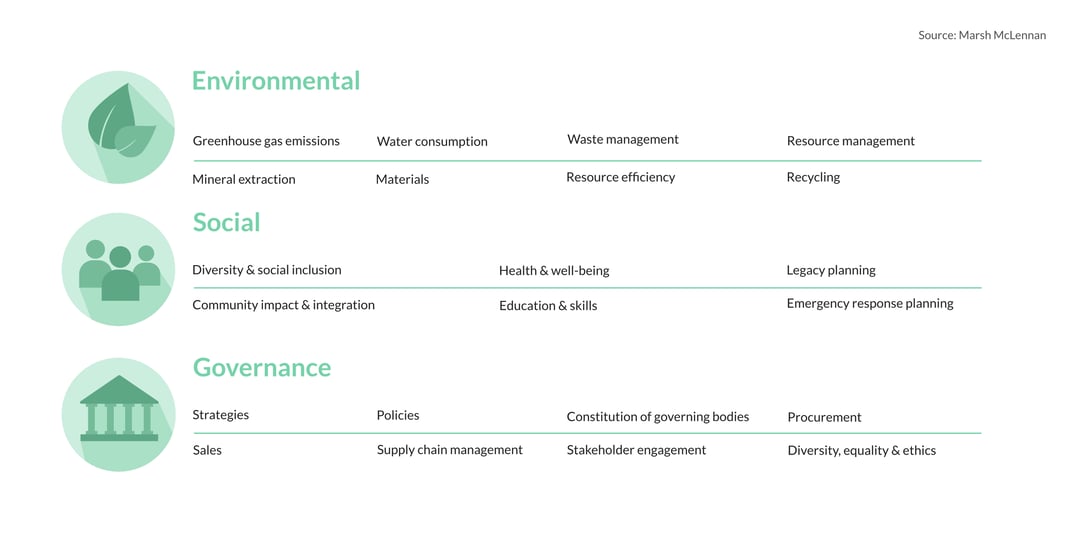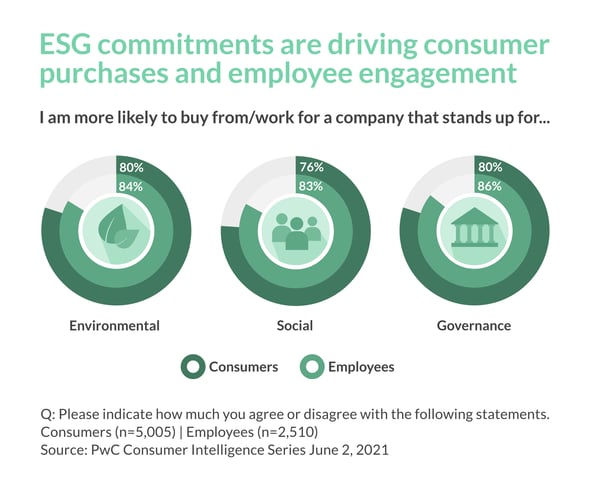In the last blog post, ‘What Is ESG, and Why Is It Important’, we investigated what ESG is and why it is important for business. In this blog piece, we will introduce you to how ESG benefits your business operationally, financially, and some examples of accreditations that demonstrate strong ESG performance.
The requirements and regulations of ESG management are constantly changing and evolving. They highlight the achievements and aims within a business from an environmental, social, and governance point of view. Through transparent ESG performance data and procedures, a company’s stakeholders are provided with a clear understanding of the impacts on the communities and environments that surround them.
A business with strong ESG performance results in a multitude of business benefits which include improved company performance and promotes future successes due to ongoing implementation and consistent regulation of company ESG protocols (Chau, V., Shandal, V., Beal, D., Tauber, L., Woods, W., & Young, D. 2020).
Throughout recent years, there has been a heightened demand for public, tangible, and reliable company data relating to how a company is operating to provide a more positive impact on the environment and communities that surround them. This increase in the public’s expectations and transparency of social and environmental challenges are only a few of the main drivers in the increase of ESG factors playing a role in the mainstream investment processes.
Not every ESG process will be relevant to every business, as seen in last week’s article, these factors displayed in Figure 1 are examples of those that are of particular interest throughout the construction industry.

The understanding and adoption of ESG best practices have been increasing over the years, many find the ESG landscape in 2022 to be more difficult than ever to navigate. As executive leadership teams face the challenge of fairly balancing the interests of their stakeholders, employees, customers, and community, the era of the “conscientious consumer” is found to be far more prolific than it has been in prior years (Atkins, B. 2022).
This growth in the conscientious consumer mentality is seen in data which was collected by PwC for their 2021 Consumer Intelligence Series survey on ESG, where they state that “83% of consumers think companies should be actively shaping ESG best practices. 91% of business leaders believe their company has a responsibility to act on ESG issues. 86% of employees prefer to support or work for companies that care about the same issues they do.”

As many companies join the movement to become more environmentally and socially conscious, it is critical that companies take meaningful and industry appropriate steps forward to further achieve ESG goals while ensuring that all progression efforts are “measured in a programmatic, factual, and consistent fashion” to prevent the entities engaging in ‘greenwashing’ (Atkins, B. 2022). An example of ‘greenwashing’ is defined by the Australian Securities & Investments Commission (ASIC) as when “the potential for [companies] to overrepresent their practices as environmentally friendly, sustainable, or ethical is referred to in the market as ‘greenwashing’” (Armour, C. 2021).
With ESG performance and the prevention of greenwashing being an ever more important aspect for businesses, there is a multitude of ways in which ESG performance can bring real value to your business. This includes, but is not limited to:
- Increased credibility and trust with stakeholders and the wider industry through transparent reporting
- Improved customer relationships and engagement by involving them in improving ESG performance
- Becoming a leader in your industry
- Improved relationships with the supply chain through transparent reporting
- Attracting talent and engaging employees
- Continuous improvement and long-term resiliency
Through the recognition of the benefits of environmental, social, and corporate governance (ESG), disclosures to companies and their investors have led to the adoption of some forms of ESG reporting requirements by stock exchanges in most developed markets in recent years. These requirements between industries can differ just as much as each company’s postcode does.
An example of this difference can be seen in the United Kingdom’s Taskforce on Climate-related Financial Disclosures (TCFD) ruling that as of the 6th of April 2022, “over 1,300 of the largest UK-registered companies will have to disclose climate-related financial information on a mandatory basis – in line with recommendations from the TCFD. This will include many of the UK’s largest trade companies, banks, and insurers, as well as private companies with over 500 employees and £500 million [USD $6.7M] in turnover” (Department for Business, Energy & Industrial Strategy, 2021). This is after New Zealand became the first country to introduce the mandatory TCFD ‘comply or explain’ disclosure for financial institutions.
Along with this, Hong Kong has set to make 2025 the year for the commencement of their TCFD plan and Switzerland has stated that they will “enshrine TCFD reporting into law and make it ‘binding’” (Naik, G. 2021). However, within Australia, broad-based ESG reporting currently remains voluntary, although certain entities have mandatory reporting obligations under various ESG-related acts, including the Modern Slavery Act 2018 (Commonwealth Act) (Wynn-Pope, P., Gill, A., Phillips, V., Guilfoyle, E. 2021).
There are many ESG certifications out in the market, however, there is one we’d like to pay close attention to, which is B Corp. As PwC aptly describes, “B Corp is to business as Fair Trade is to coffee” which means that B Corp helps provide certification to businesses that care about the environment and society as much as their bottom line. This form of accreditation is assessed by the not-for-profit B Labs which works to ensure businesses are achieving at least the minimum score of their social and environmental standards which is then used as a form of competitive advantage.
B Corp has been an established accreditor since its founding in the U.S. in 2007, which has since seen many major companies achieve B Corporation Certifications like Ben and Jerry’s and Patagonia amongst many others (PwC, n.d.).
There are many positives about attaining B Corp certifications and other ESG relevant accreditations which can include:
- Positive revenue growth - UK-based B Corp businesses have reported seeing an average revenue growth upwards of 14% year-on-year since commencement in 2015 (PwC, n.d.).
- Positive sustainability credentials provide businesses with a competitive edge and aid in keeping eco-friendly and socially conscious businesses at the top of consumers’ ‘mental shopping list’.
- Businesses that engage in positive environmental and social practices also reap the benefits of a greater recruitment and investor appeal which can lead the way to aid businesses in addressing society’s most critical challenges while also increasing their profitability.
With each industry needing its own specialized criteria, in the next blog ‘ESG Reporting Frameworks: What Are They?’, we look into the significance and offerings of several reporting and monitoring frameworks that are on offer in this present day.
Written by Adrian Sakellaris
References List:
- Armour, C. (2021). What is “Greenwashing” and What are its Potential Threats? ASIC.
- Atkins, B. (2022). ESG: Environmental, Social, Greenwashing? Forbs.
- Brown, K., Eltobgy, M., Chau, V., Shandal, V., Beal, D., Tauber, L., Woods, W., & Young, D. (2020). Embracing the New Age of Materiality: Harnessing the Peace of Change in ESG. World Economic Forum.
- Chau, V., Shandal, V., Beal, D., Tauber, L., Woods, W., & Young, D. (2020). Unlocking Tomorrow’s ESG Opportunities. Boston Consulting Group.
- Davies, J. (2021). Our Approach to Reporting, Disclosure, and Transparency. Multiplex.
- Herman, C., Kinghorn, R., Parrish, D., O’Connell, K., (2021). Beyond Compliance: Consumers and Employees Want Business to Do More on ESG. PwC.
- Kelly, D. (n.d.). Exploring The Impact of ESG on Contractors. Marsh McLennan.
- Naik, G. (2021). Companies, Investors Face New Pressure from Compulsory Disclosure of Climate Risk. S&P Global.
- PwC. (n.d.). A Guide to the UK B Corporation Movement. PwC.
- Quinson, T. (2021). Regulators Intensify ESG Scrutiny as Greenwashing Explodes.
- Wynn-Pope, P., Gill, A., Phillips, V., Guilfoyle, E. (2021). Mandatory ESG Reporting Gains Momentum. Corrs Chambers Westgarth.
